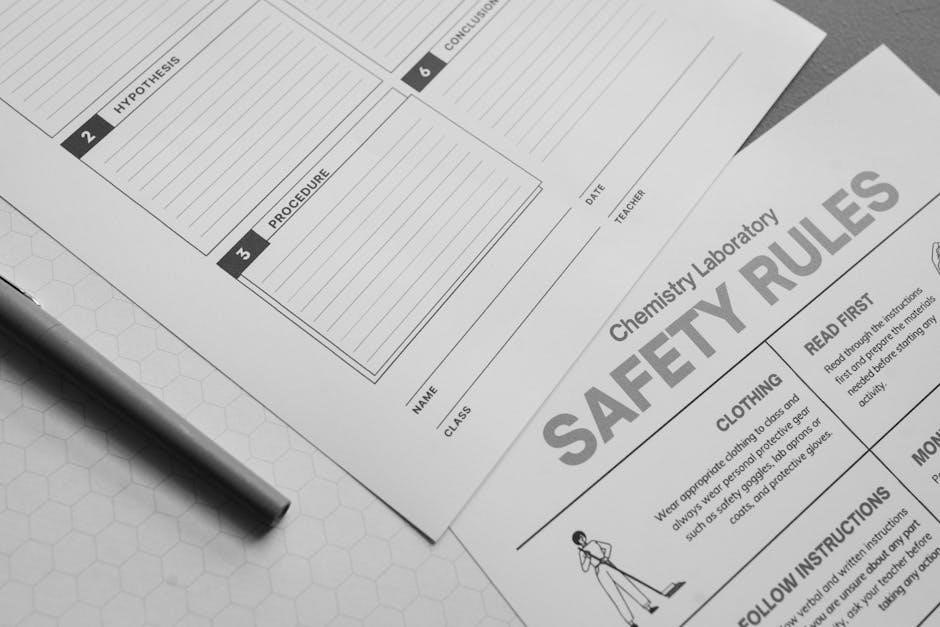Codependency worksheets are effective tools for self-reflection and growth‚ helping individuals recognize patterns‚ set boundaries‚ and improve communication in relationships. Designed to guide users in understanding and addressing codependent behaviors‚ these resources are ideal for therapy and personal development‚ offering a structured approach to fostering healthier connections and emotional well-being.
1.1 What Are Codependency Worksheets?
Codependency worksheets are structured tools designed to help individuals identify and address codependent patterns in their relationships. They typically include guide questions‚ exercises‚ and prompts that encourage self-reflection‚ goal-setting‚ and practical steps to improve emotional health. These worksheets are often used in therapy or personal growth journeys‚ providing a clear framework for understanding and overcoming codependent behaviors. Many are available as free PDF downloads‚ making them accessible for anyone seeking to explore and transform their relationship dynamics.
1.2 The Purpose of Codependency Worksheets
Codependency worksheets are designed to help individuals recognize and address unhealthy relationship patterns. Their purpose is to guide users through self-reflection‚ identifying codependent behaviors‚ and setting boundaries. These tools encourage personal growth by promoting emotional awareness‚ improving communication‚ and fostering healthier relationship dynamics. They also serve as a therapeutic aid‚ helping individuals break free from codependent cycles and develop more balanced‚ fulfilling connections. By addressing root causes and encouraging mindful actions‚ these worksheets empower users to transform their relationships and improve their overall well-being.

Understanding Codependency
Codependency is a behavioral condition rooted in trauma or low self-worth‚ leading to one-sided‚ emotionally draining relationships. It often stems from neglect‚ substance abuse‚ or identity loss.
2.1 Defining Codependency
Codependency is a behavioral pattern where individuals prioritize others’ needs over their own‚ fostering imbalanced and emotionally draining relationships. It often arises from trauma‚ neglect‚ or substance abuse‚ leading to low self-worth and identity loss. Codependent relationships are typically one-sided‚ with one person enabling another’s harmful behaviors while neglecting their own emotional and mental well-being. This dynamic can perpetuate cycles of dependency‚ making it challenging to establish healthy boundaries or mutual respect.
2.2 Signs and Symptoms of Codependency
Common signs of codependency include controlling behavior‚ people-pleasing‚ and difficulty setting boundaries. Individuals may feel responsible for others’ emotions or actions‚ leading to emotional distress. They often neglect their own needs‚ avoid conflict‚ and struggle with self-worth. Fear of abandonment and perfectionism are prevalent‚ as well as enabling or denying problematic behaviors in others. These patterns can manifest as distrust‚ avoidance of feelings‚ and an excessive need for approval‚ ultimately hindering personal growth and healthy relationships.
2.3 The Impact of Codependency on Relationships
Codependency often creates imbalanced relationships‚ fostering emotional draining and enabling harmful behaviors. It can lead to resentment‚ as one person prioritizes others’ needs over their own‚ while the other becomes overly dependent. This dynamic prevents mutual respect and authentic connection‚ hindering personal growth. Codependency can also perpetuate cycles of control‚ distrust‚ and avoidance‚ making it challenging to establish healthy boundaries. Over time‚ it may result in emotional stagnation‚ as individuals struggle to maintain their sense of identity and independence within the relationship.

Benefits of Using Codependency Worksheets
Codependency worksheets offer structured tools for self-reflection‚ helping individuals identify patterns‚ set boundaries‚ and improve communication. They foster emotional awareness‚ empowerment‚ and healthier relationship dynamics‚ promoting personal growth and recovery.
3.1 Identifying Codependent Patterns
Codependency worksheets provide structured exercises to help individuals recognize unhealthy patterns‚ such as people-pleasing or emotional dependence. By exploring personal behaviors and relationship dynamics‚ users gain clarity on self-sacrificing tendencies and enabling habits. These tools encourage honest self-assessment‚ guiding users to pinpoint specific areas where codependency manifests‚ such as fear of abandonment or difficulty setting boundaries. Identifying these patterns is the first step toward breaking free from codependent cycles and fostering healthier‚ more balanced relationships.
3.2 Promoting Self-Reflection and Awareness
Codependency worksheets facilitate self-reflection by guiding users to examine their emotions‚ behaviors‚ and relationship dynamics. Through targeted exercises‚ individuals can identify their needs and boundaries‚ fostering a deeper understanding of their role in codependent relationships. These tools encourage users to explore patterns of people-pleasing‚ emotional dependence‚ and self-sacrifice‚ promoting awareness of how these behaviors impact their well-being. By reflecting on their experiences‚ individuals gain insights into their emotional responses and develop the clarity needed to address codependent tendencies effectively;
3.3 Setting Boundaries and Improving Communication
Codependency worksheets play a crucial role in helping individuals establish healthy boundaries and enhance communication skills. Through guided exercises‚ users learn to identify their emotional and mental needs‚ fostering assertiveness and respectful expression of feelings. These tools encourage individuals to practice setting limits without guilt and communicate more effectively‚ reducing conflicts and fostering mutual respect in relationships. By addressing communication patterns‚ worksheets empower users to create healthier dynamics‚ ensuring both parties feel heard and valued.
Types of Codependency Worksheets
Codependency worksheets come in various forms‚ including free PDF downloads‚ therapist-approved templates‚ and specialized sheets for specific needs‚ helping users address unique challenges and goals effectively;
4.1 Free Codependency Worksheets PDF
Free codependency worksheets in PDF format are widely available online‚ offering accessible tools for self-reflection and growth. These resources provide structured exercises to identify patterns‚ set boundaries‚ and improve communication. Designed for personal use or therapeutic settings‚ they guide users through introspective questions and goal-setting activities. Websites like CarePatron and Etsy offer downloadable worksheets‚ making it easy to start the journey toward healthier relationships and emotional well-being without financial barriers‚ ensuring accessibility for everyone seeking help.
4.2 Therapist-Approved Codependency Worksheets
Therapist-approved codependency worksheets are tailored for clinical settings‚ helping clients explore and address codependent behaviors. These tools‚ often used in therapy sessions‚ include guided questions to foster self-awareness and strategies for healthier relationships. Professionals recommend them for their effectiveness in encouraging emotional growth and boundary-setting. Many therapists integrate these worksheets into treatment plans‚ ensuring clients receive structured support. By addressing specific needs‚ they complement traditional therapy methods‚ aiding in the recovery journey and promoting lasting change.
4.3 Specialized Worksheets for Specific Needs
Specialized codependency worksheets cater to unique circumstances‚ addressing specific issues like narcissistic relationships or addiction. These tailored tools help individuals identify patterns and develop strategies for their particular challenges. For instance‚ worksheets targeting emotional abuse focus on rebuilding self-worth‚ while those for co-occurring addictions emphasize dual recovery. By offering targeted exercises‚ they provide a personalized approach to healing‚ making them invaluable for diverse client needs and therapeutic contexts.
How to Use Codependency Worksheets Effectively
Effectively using codependency worksheets involves guided reflection‚ setting boundaries‚ and tracking progress. They help individuals identify patterns‚ improve communication‚ and foster healthier relationships through structured self-analysis.
5.1 Step-by-Step Guide to Completing Worksheets
Begin by identifying the relationship or situation you wish to address. Answer guide questions honestly to create emotional distance and reflect on codependent patterns. Next‚ focus on self-reflection to understand your needs and boundaries. Set practical goals for improving the relationship or moving away from it. Finally‚ review your progress and celebrate milestones‚ using the insights gained to foster healthier connections and personal growth.
5.2 Integrating Worksheets into Therapy Sessions
Therapists can incorporate codependency worksheets into sessions to deepen client insights and facilitate structured discussions. Begin by assigning specific sections of the worksheet as homework‚ then review answers during sessions to explore patterns and emotions. Use guide questions to prompt reflective conversations and help clients identify boundaries. This collaborative approach allows therapists to tailor interventions and provide personalized feedback‚ enhancing the client’s journey toward healthier relationships and emotional independence.
5.3 Tracking Progress and Celebrating Milestones
Regularly tracking progress using codependency worksheets helps clients monitor their growth and stay motivated. Set specific‚ measurable goals and review completed worksheets periodically to assess improvements. Celebrate milestones‚ such as establishing boundaries or prioritizing self-care‚ to reinforce positive changes. Therapists can provide constructive feedback and encouragement‚ helping clients stay accountable and focused on their journey. Acknowledging progress‚ no matter how small‚ fosters a sense of accomplishment and strengthens commitment to overcoming codependent patterns.
Popular Resources for Codependency Worksheets
Discover popular resources offering free codependency worksheets‚ including websites‚ recommended books‚ and online communities‚ providing accessible tools for personal growth and therapeutic support.
6.1 Websites Offering Free Downloads
Websites like CarePatron‚ Etsy‚ and Therapy Aid provide free downloadable codependency worksheets in PDF format. These resources include guided questions‚ reflective exercises‚ and structured prompts to help individuals identify codependent patterns‚ set boundaries‚ and improve communication. Many sites also offer specialized worksheets tailored to specific needs‚ such as emotional therapy journals or workbooks for narcissistic relationships. These tools are designed to support personal growth and therapeutic progress‚ making them accessible for both self-help and professional therapy settings.
6.2 Recommended Books and Workbooks
Books like the Codependency Journal Workbook and Codependency Worksheets PDF offer comprehensive guides for addressing codependent behaviors. These resources provide practical exercises‚ prompts‚ and real-life examples to help individuals identify patterns and develop healthier relationships. Many workbooks include sections for goal setting‚ emotional reflection‚ and communication strategies‚ making them invaluable for both personal growth and therapeutic settings. They complement online worksheets by offering in-depth insights and actionable steps for long-term recovery and self-improvement.
6.3 Online Communities and Support Groups
Online communities and support groups provide a safe space for individuals to share experiences and learn from others dealing with codependency. Platforms like Codependents Anonymous and specialized forums offer resources‚ including codependency worksheets PDF‚ to aid in recovery. These communities often feature expert advice‚ shared testimonials‚ and guided discussions‚ fostering connection and understanding. They complement therapy by offering ongoing support and practical tools‚ helping individuals stay accountable and motivated throughout their journey toward healthier relationships and personal growth.

Overcoming Codependency
Overcoming codependency involves setting boundaries‚ prioritizing self-care‚ and practicing self-reflection. Worksheets and guided exercises help individuals identify patterns and develop healthier relationship dynamics.
7.1 Breaking Free from Codependent Cycles
Breaking free from codependent cycles requires self-awareness‚ boundary-setting‚ and a commitment to personal growth. Codependency worksheets guide individuals in identifying unhealthy patterns and taking actionable steps toward change. By fostering self-reflection‚ these tools help create emotional distance‚ enabling users to evaluate relationships objectively. This process empowers individuals to recognize their own needs and desires‚ challenging the cycles of dependency. Worksheets encourage accountability and provide structured exercises to redefine relationship dynamics‚ promoting healthier‚ more balanced connections. The journey involves embracing vulnerability‚ practicing self-care‚ and fostering open communication to break free from harmful cycles.
7.2 Building Healthy Relationships
Building healthy relationships involves fostering mutual respect‚ trust‚ and emotional balance. Codependency worksheets play a crucial role by helping individuals identify and challenge unhealthy patterns‚ promoting self-awareness and accountability. These tools encourage setting boundaries‚ practicing effective communication‚ and prioritizing self-care. By addressing codependent behaviors‚ individuals can shift from enabling or controlling dynamics to nurturing partnerships rooted in empathy and understanding. Worksheets guide users in reflecting on their needs and desires‚ fostering a foundation for relationships that honor personal growth and mutual fulfillment‚ ultimately leading to more authentic and satisfying connections.
7.3 The Role of Self-Care in Recovery
Self-care is essential in recovery from codependency‚ as it helps individuals reclaim their identity and emotional well-being. Codependency worksheets often include prompts that guide users in prioritizing self-care practices‚ such as journaling‚ setting boundaries‚ and engaging in activities that foster personal growth. By focusing on self-care‚ individuals can break free from codependent patterns and cultivate healthier habits‚ leading to more balanced and fulfilling relationships. Regular self-care practices empower individuals to maintain emotional resilience and independence‚ which are critical for long-term recovery and personal transformation.

Case Studies and Success Stories
Real-life examples highlight how codependency worksheets have transformed lives‚ offering practical insights and testimonials from individuals who achieved emotional freedom and healthier relationships through structured self-reflection.
8.1 Real-Life Examples of Recovery
Individuals using codependency worksheets have shared inspiring stories of transformation. For instance‚ Sarah‚ a client‚ used the “Avoiding Codependency Worksheet” to recognize her patterns and set boundaries‚ leading to healthier relationships. Similarly‚ John found clarity through guided questions‚ enabling him to break free from codependent cycles. These examples illustrate how structured self-reflection fosters emotional growth and empowers individuals to reclaim their autonomy‚ creating balanced and fulfilling connections in their lives.
8.2 Testimonials from Worksheet Users
Users of codependency worksheets often share powerful stories of personal growth. Many describe the worksheets as “life-changing‚” helping them identify patterns and set boundaries. One user noted‚ “These exercises guided me to reclaim my identity and foster healthier relationships.” Another shared‚ “The structured prompts helped me confront denial and embrace self-care.” Testimonials highlight how these tools empower individuals to break free from codependent cycles‚ leading to greater self-awareness and more balanced connections. Their experiences inspire others to embark on similar transformative journeys.
8.3 Lessons Learned from Overcoming Codependency
Overcoming codependency teaches valuable lessons about self-care‚ boundary-setting‚ and emotional resilience. Many individuals learn to recognize unhealthy patterns and prioritize their own needs. A common takeaway is the importance of balancing relationships with personal growth. By addressing codependent behaviors‚ people often discover their true worth and develop healthier communication skills. These lessons empower individuals to form authentic connections and maintain their independence within relationships‚ fostering long-term emotional well-being and resilience.
Codependency worksheets offer a powerful tool for personal growth‚ helping individuals break free from unhealthy patterns and cultivate fulfilling relationships. Continuous self-reflection and boundary-setting are key to lasting recovery and emotional well-being.
9.1 The Importance of Continuous Growth
Continuous growth is essential for overcoming codependency‚ as it fosters self-awareness‚ resilience‚ and healthier relationships. By consistently engaging in self-reflection and boundary-setting‚ individuals can break free from toxic patterns. Growth encourages personal development‚ emotional resilience‚ and a deeper understanding of one’s needs. It empowers individuals to build authentic connections and maintain emotional well-being. Embracing lifelong growth ensures sustained progress and lasting recovery from codependent behaviors‚ promoting a fulfilling and balanced life.
9.2 Encouragement for Ongoing Self-Improvement
Ongoing self-improvement is crucial for lasting recovery from codependency. Encouraging individuals to embrace continuous growth helps them develop healthier habits and relationships. Codependency worksheets serve as powerful tools‚ guiding users to reflect on their progress and set achievable goals. By fostering self-awareness and accountability‚ these resources empower individuals to break free from codependent cycles. Celebrating small victories and staying committed to personal development ensures a journey toward emotional freedom and authentic connections. Growth is a lifelong process‚ and consistent effort leads to profound transformation and well-being.
9.3 Final Thoughts on the Journey to Recovery
The journey to recovery from codependency is a transformative process that requires patience‚ self-compassion‚ and dedication. Codependency worksheets serve as invaluable tools‚ guiding individuals toward self-awareness‚ healthier boundaries‚ and more balanced relationships. Embracing self-care and prioritizing personal growth are essential for sustained progress. While the path may be challenging‚ the rewards of emotional freedom and authentic connections make the effort worthwhile. Encouraging continuous learning and self-reflection ensures long-term healing and fosters a life of fulfillment and resilience.
